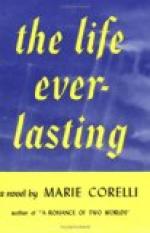Dr. Brayle was thoroughly embarrassed,—but he tried to cover his confusion by an awkward laugh.
“Well, you have made a very clever hit!” he said—“Quite a random shot, of course—which by mere coincidence went to its mark! It’s quite true I have brought with me a curious piece of jewel-work which I always carry about wherever I go—and something moved me to-night to ask your opinion of its value, as well as to place its period. It is old Italian; but even experts are not agreed as to its exact date.”
He put his hand in his breast pocket and drew out a small silk bag from which he took with great care a collar of jewels, designed in a kind of chain-work which made it perfectly flexible. He laid it out on the table,—and I bit my lip hard to suppress an involuntary exclamation. For I had seen the thing before—and for the immediate moment could not realise where, till a sudden flash of light through the cells of my brain reminded me of that scene of love and death in the vision of the artist’s studio when the name ‘Cosmo de Medicis’ had been whispered like an evil omen. The murderer in that dream-picture had worn a collar of jewels precisely similar to the one I now saw; but I could only keep silence and listen with every nerve strained to utmost attention while Santoris took the ornament in his hand and looked at it with an intent earnestness in which there was almost a touch of compassion.
“A beautiful piece of workmanship,” he said, at last, slowly, while Mr. Harland, Catherine, and Swinton the secretary all drew up closer to him at the table and leaned eagerly forward—“And I should say”— here he raised his eyes and looked full at the dark, brooding, sinister face of Brayle—“I should say that it belonged to the Medici period. It must have been part of the dress of a nobleman of that time—the design seems to me to be Florentine. Perhaps if these jewels could speak they might tell a strange story!—they are unhappy stones!”
“Unhappy!” exclaimed Catherine—“You mean unlucky?”
“No!—there is no such thing as luck,” answered Santoris, quietly, turning the collar over and over in his hands—“Not for either jewels or men! But there is unhappiness,—and unhappiness simply means life being put to wrong uses. I call these gems ‘unhappy’ because they have been wrongfully used. A precious stone is a living thing—it absorbs influences as the earth absorbs light, and these jewels have absorbed some sense of evil that renders them less beautiful than they might be. These diamonds and rubies, these emeralds and sapphires, have not the full lustre of their own true nature,—they are in the condition of pining flowers. It will take centuries before they resume their natural brilliancy. There is some tragedy hidden among them.”
Dr. Brayle looked amused.




